Manual Rigid Stands
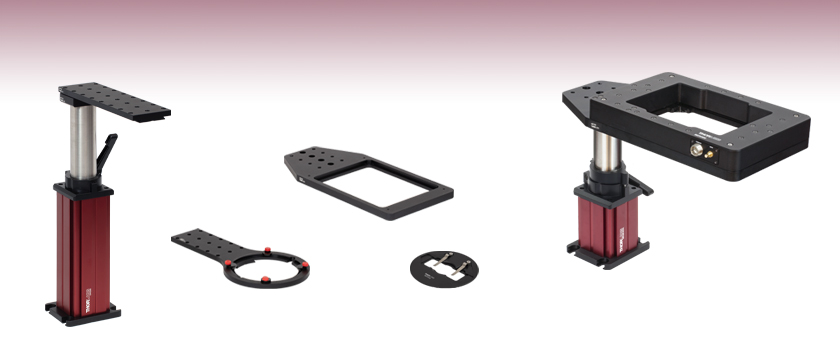
- Height-Adjustable Stands with 360° Rotation
- Mount Samples & Experimental Apparatuses
- Compatible with Upright or Inverted Microscopes
MP20
200 mm Rigid Stand
with 8" Rail Platform
Application Idea
MZS500-E Z-Axis Piezo Stage
Mounted Using an MPRM Insert,
MPP10 Post, and LPH100 Holder
MPRM
Rectangular Insert Holder
MPSH2
Low-Profile Slide Holder
MPRC
Ø110 mm Insert or
Recording Chamber Holder

Please Wait
| Table 1.1 Quick Links | |||
|---|---|---|---|
| DIY Rigid Stands | |||
 Step 1: Choose a Post Holder |
 Step 2: Choose a Post |
 Step 3: Choose a Rail or Insert Holder |
 Step 4 (Optional): Choose an Insert |
| Preconfigured Rigid Stands | |||
 Rigid Stands with Dovetail Rails |
 Rigid Stands with Rectangular Insert Holders |
||
| Translation Stages for Manual Rigid Stands | ||
|---|---|---|
 Manual Stages with Quick Connect |
 Self-Contained Manual Stages |
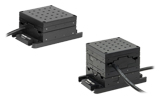 Motorized Stages |
Features
- Manual Rigid Stands Hold Samples or Experimental Apparatuses Underneath and Around the Objective
- Designed for Slides, Petri Dishes, Recording Chambers, Micromanipulators, Well Plates, and DIY Inserts
- Suitable for Upright and Inverted Microscopes
- Design Your Own or Purchase Preconfigured Stands
- Configurations Capable of Platform Heights from 151.4 mm to 514.2 mm (5.96" to 20.24")
- Post & Post Holders Are Compatible with 66 mm Rail Accessories and Mounts
- Base Plate Features Four Slots for 1/4"-20 (M6 x 1.0) Cap Screws for Table Mounting
- Translation Stages for Rigid Stands Available Separately
Thorlabs' Manually Adjustable Rigid Stands provide additional flexibility and adaptability to any microscopy application. Each stand has a slim profile that consumes a minimal amount of space in and around the optical path. This leaves ample approach room for any objectives, micromanipulators, a condenser, and other equipment, making it easy to work around the setup. Each post offers 360° rotational adjustment allowing a mounted component to be easily positioned within the imaging system. Additionally, with accessories designed for slides, petri dishes, recording chambers, micromanipulators, well plates, and general electrophysiology applications, our rigid stands can be used in virtually any setup. Thorlabs also offers a motorized rigid stand for precise, repeatable height adjustment.
DIY or Preconfigured Stands
Manual rigid stands may be purchased preconfigured or as separate components, as shown in Table 1.1. Each stand consists of a post holder, post, and rail or insert holder; a variety of inserts are also available, including microscope slide holders and breadboards. We also offer preconfigured stands at select heights, available with dovetail rails or rectangular insert holders.
Translation Stages
We also offer two types of manual translation stages that provide 25 mm of translation in one or two horizontal axes and are compatible with our manual rigid stands via the MPA1(/M) adapter plate. The manual stages with quick connect feature dovetails that allow users to construct their own multi-axis stage, while the self-contained manual stages offer a more compact footprint. Thorlabs also manufactures motorized translation stages for these rigid stands that enable 1" of horizontal travel in one or two axes when used with the PLST(/M) top plate.
For sample holders that attach directly to the DIY Cerna® microscope body, please see our manual and motorized XY stages.
Post Adjustment Features
As illustrated in Video 1.3, a quick-release clamp locks and unlocks the post. The post collar included with the post holder features an alignment pin can be used to maintain the post's height during its rotation. The alignment pin acts as a hard mechanical stop that lets you quickly return to a previously set angle. To raise or lower the post within its given vertical range, it is necessary to loosen the collar, which is locked onto the post using a cap screw that accepts a 4 mm (5/32") balldriver. Each post is housed inside a red post holder, which is compatible with 66 mm rail accessories and optomechanical mounts.
Video 1.3 Manual Rigid Stand Adjustment
Building a Cerna® Microscope
The Cerna microscopy platform's large working volume and system of dovetails make it straightforward to connect and position the components of the microscope. This flexibility enables simple and stable set up of a preconfigured microscope, and provides easy paths for later upgrades and modification. See the videos in this tab for a couple of examples of the assembly of some DIY Cerna microscopes.
DIY Cerna Design and Assembly
Video 20A Walkthrough of a DIY Microscope Configuration
This DIY microscope uses a CSA3000(/M) Breadboard Top, a CSA2001 Dovetail Adapter, our CSA1001 and CSA1002 Fixed Arms, and other body attachments and extensions. These components provide interfaces to our lens tube and cage construction systems, allowing the rig to incorporate two independent trans-illumination modules, a home-built epi-illumination path, and a custom sample viewing optical path.
The simplicity of Thorlabs optomechanical interfaces allows a custom DIY microscope to be quickly assembled and reconfigured for custom imaging applications.
| Posted Comments: | |
Patrick Lee
(posted 2021-10-21 21:03:41.95) I wish to mount the base of MP150 on the XT95SD-500 one-side rail via XT95P12/M - Rail plate. It is possible ? If cannot, could you advice other methods. Thank you. cdolbashian
(posted 2021-10-29 11:14:09.0) Thank you for reaching out to us at Thorlabs regarding the compatibility of these parts. Unfortunately these two parts are not directly compatible, however I have contacted you directly to find a solution! Stepan Kortus
(posted 2021-06-08 10:16:44.28) The MP200 drawing says it has the holes for mounting to tabletop with distance 50.8 x 75.2-85.3 mm. Can be the MP200 directly mounted to the metric tabletop with M6 holes distributed in 25mm grid layout? Thank you. YLohia
(posted 2021-06-15 11:05:39.0) Hello, thank you for contacting Thorlabs. The MP200 has counterbored slots for mounting. Therefore, you will have enough slack (or tolerance) for using M6 capscrews in a 25 mm hole spacing. jtdo
(posted 2019-03-08 17:54:35.08) Is the red part of the rigid stand the same as a 66mm optical rail? And if so, can I mount the rail carriage (XT66P2) to it? Thanks! mmcclure
(posted 2019-03-11 01:58:11.0) Hello, thank you for contacting us. The rigid stands' red post holder is compatible with our 66 mm optical rail components and accessories, including the XT66P2 rail carriage. We will update the webpage presentation to make this compatibility more apparent. timothee.labouret
(posted 2017-06-26 17:01:08.433) Hi,
I have a question regarding the MP200. Is the post removable from the post holder in order to extend it with another 1.5" post ? Also, is the platform removable from the post to yield a normal 1.5" post ? Thank you for your support. Regards tfrisch
(posted 2017-06-27 04:37:05.0) Hello, thank you for contacting Thorlabs. The post is removable and a different 1.5" diameter post can be used. |
Click on the different parts of the microscope to explore their functions.
Elements of a Microscope
This overview was developed to provide a general understanding of a Cerna® microscope. Click on the different portions of the microscope in Figure 77A or use the links below to learn how a Cerna microscope visualizes a sample.
Terminology
Arm: Holds components in the optical path of the microscope.
Bayonet Mount: A form of mechanical attachment with tabs on the male end that fit into L-shaped slots on the female end.
Bellows: A tube with accordion-shaped rubber sides for a flexible, light-tight extension between the microscope body and the objective.
Breadboard: A flat structure with regularly spaced tapped holes for DIY construction.
Dovetail: A form of mechanical attachment for many microscopy components. A linear dovetail allows flexible positioning along one dimension before being locked down, while a circular dovetail secures the component in one position. See the Microscope Dovetails tab or here for details.
Epi-Illumination: Illumination on the same side of the sample as the viewing apparatus. Epi-fluorescence, reflected light, and confocal microscopy are some examples of imaging modalities that utilize epi-illumination.
Filter Cube: A cube that holds filters and other optical elements at the correct orientations for microscopy. For example, filter cubes are essential for fluorescence microscopy and reflected light microscopy.
Köhler Illumination: A method of illumination that utilizes various optical elements to defocus and flatten the intensity of light across the field of view in the sample plane. A condenser and light collimator are necessary for this technique.
Nosepiece: A type of arm used to hold the microscope objective in the optical path of the microscope.
Optical Path: The path light follows through the microscope.
Rail Height: The height of the support rail of the microscope body.
Throat Depth: The distance from the vertical portion of the optical path to the edge of the support rail of the microscope body. The size of the throat depth, along with the working height, determine the working space available for microscopy.
Trans-Illumination: Illumination on the opposite side of the sample as the viewing apparatus. Brightfield, differential interference contrast (DIC), Dodt gradient contrast, and darkfield microscopy are some examples of imaging modalities that utilize trans-illumination.
Working Height: The height of the support rail of the microscope body plus the height of the base. The size of the working height, along with the throat depth, determine the working space available for microscopy.
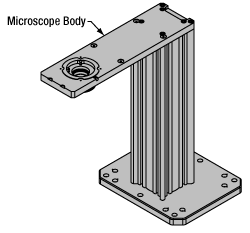 Click to Enlarge
Click to EnlargeFigure 77C Cerna Microscope Body
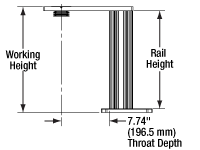
Click to Enlarge
Figure 77B Body Details
Microscope Body
The microscope body provides the foundation of any Cerna microscope. The support rail utilizes 95 mm rails machined to a high angular tolerance to ensure an aligned optical path and perpendicularity with the optical table. The support rail height chosen (350 - 600 mm) determines the vertical range available for experiments and microscopy components. The 7.74" throat depth, or distance from the optical path to the support rail, provides a large working space for experiments. Components attach to the body by way of either a linear dovetail on the support rail, or a circular dovetail on the epi-illumination arm (on certain models). Please see the Microscope Dovetails tab or here for further details.
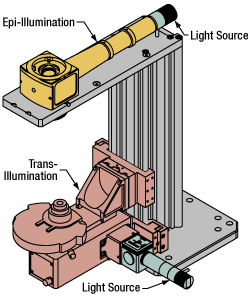 Click to Enlarge
Click to EnlargeFigure 77D Illumination with a Cerna microscope can come from above (yellow) or below (orange). Illumination sources (green) attach to either.
Illumination
Using the Cerna microscope body, a sample can be illuminated in two directions: from above (epi-illumination, see yellow components in Figure 77D) or from below (trans-illumination, see orange components in Figure 77D).
Epi-illumination illuminates on the same side of the sample as the viewing apparatus; therefore, the light from the illumination source (green) and the light from the sample plane share a portion of the optical path. It is used in fluorescence, confocal, and reflected light microscopy. Epi-illumination modules, which direct and condition light along the optical path, are attached to the epi-illumination arm of the microscope body via a circular D1N dovetail (see the Microscope Dovetails tab or here for details). Multiple epi-illumination modules are available, as well as breadboard tops, which have regularly spaced tapped holes for custom designs.
Trans-illumination illuminates from the opposite side of the sample as the viewing apparatus. Example imaging modalities include brightfield, differential interference contrast (DIC), Dodt gradient contrast, oblique, and darkfield microscopy. Trans-illumination modules, which condition light (on certain models) and direct it along the optical path, are attached to the support rail of the microscope body via a linear dovetail (see Microscope Dovetails tab or here). Please note that certain imaging modalities will require additional optics to alter the properties of the beam; these optics may be easily incorporated in the optical path via lens tubes and cage systems. In addition, Thorlabs offers condensers, which reshape input collimated light to help create optimal Köhler illumination. These attach to a mounting arm, which holds the condenser at the throat depth, or the distance from the optical path to the support rail. The arm attaches to a focusing module, used for aligning the condenser with respect to the sample and trans-illumination module.
 |
 |
 |
 |
 |
 |
 |
 |
| Epi-Illumination Modules | Breadboards & Body Attachments |
Brightfield | DIC | Dodt | Condensers | Condenser Mounting | Light Sources |
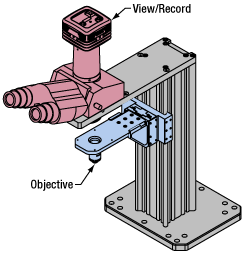 Click to Enlarge
Click to EnlargeFigure 77E Light from the sample plane is collected through an objective (blue) and viewed using trinocs or other optical ports (pink).
Sample Viewing/Recording
Once illuminated, examining a sample with a microscope requires both focusing on the sample plane (see blue components in Figure 77E) and visualizing the resulting image (see pink components).
A microscope objective collects and magnifies light from the sample plane for imaging. On the Cerna microscope, the objective is threaded onto a nosepiece, which holds the objective at the throat depth, or the distance from the optical path to the support rail of the microscope body. This nosepiece is secured to a motorized focusing module, used for focusing the objective as well as for moving it out of the way for sample handling. To ensure a light-tight path from the objective, the microscope body comes with a bellows (not pictured).
Various modules are available for sample viewing and data collection. Trinoculars have three points of vision to view the sample directly as well as with a camera. Double camera ports redirect or split the optical path among two viewing channels. Camera tubes increase or decrease the image magnification. For data collection, Thorlabs offers both cameras and photomultiplier tubes (PMTs), the latter being necessary to detect fluorescence signals for confocal microscopy. Breadboard tops provide functionality for custom-designed data collection setups. Modules are attached to the microscope body via a circular dovetail (see the Microscope Dovetails tab or here for details).
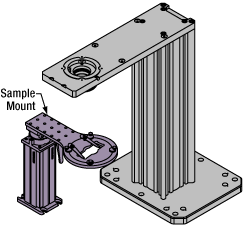 Click to Enlarge
Click to EnlargeFigure 77F The rigid stand (purple) pictured is one of various sample mounting options available.
Sample/Experiment Mounting
Various sample and equipment mounting options are available to take advantage of the large working space of this microscope system. Large samples and ancillary equipment can be mounted via mounting platforms, which fit around the microscope body and utilize a breadboard design with regularly spaced tapped through holes. Small samples can be mounted on rigid stands (for example, see the purple component in Figure 77F), which have holders for different methods of sample preparation and data collection, such as slides, well plates, and petri dishes. For more traditional sample mounting, slides can also be mounted directly onto the microscope body via a manual XY stage. The rigid stands can translate by way of motorized stages (sold separately), while the mounting platforms contain built-in mechanics for motorized or manual translation. Rigid stands can also be mounted on top of the mounting platforms for independent and synchronized movement of multiple instruments, if you are interested in performing experiments simultaneously during microscopy.

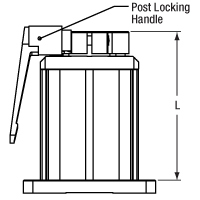
Figure G1.1 Manual Rigid Stand Post Holder Diagram
- Empty Post Holder with Included Post Collar
- Available in Four Heights
- Accepts Ø1.5" Stainless Steel Posts (Sold Below)
- Compatible with 66 mm Rail Accessories and Mounts
- Translation Stages for Rigid Stands Available
Thorlabs' LPH Series Rigid Stand Post Holders are designed for Ø1.5" posts with 66 mm dovetail clamps (sold below) and also compatible with our standard Ø1.5" posts. Each holder includes a locking collar and alignment pin for stable and repeatable positioning. They are available in heights of 100 mm, 150 mm, 200 mm, and 250 mm, as defined by Figure G1.1.
Post holders can also be used to save reference positions on the tabletop or safely store sample holders that are not in use. Note that rigid stands with Item # prefixes MP15, MP20, and MP25 come with 150 mm, 200 mm, and 250 mm tall posts, respectively.
The base can be secured to a tabletop via four counterbored slots that accept 1/4"-20 (M6 x 1.0) cap screws. The manual rigid stand can be mounted to our quick-connect and self-contained manual translation stages using the MPA1(/M) adapter plate or our motorized translation stages using the PLST(/M) adapter plate. These post holders also accept Ø1.5" stainless steel posts for DIY mounting options.

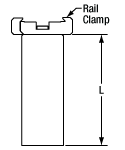
Figure G2.2 Manual Rigid Stand Post Diagram
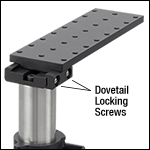
Click for Details
Figure G2.1 The clamp locks onto rail or insert holder arms via two locking screws.
- Ø1.5" Stainless Steel Posts with 66 mm Rail Clamp for Rail or Arm (Sold Below)
- Quick-Release Clamp Enables Tool-Free Positioning
- Available in Four Heights: 100 mm to 250 mm
- Fits into Ø1.5" Post Holder (Sold Above)
- Compatible with 66 mm Rails and Accessories
These solid stainless steel Ø1.5" posts, offered in heights ranging from 100 mm (4") to 250 mm (10"), feature an attached clamp for 66 mm dovetail rails (a black anodized version of our XT66C4 clamp). The clamp is engaged using 2.5 mm hex clamping screws, as shown in Figure G2.1. The posts are compatible with the post holders sold above and the clamp is designed to hold the single dovetail rails and insert holder arms sold below in Step 3.

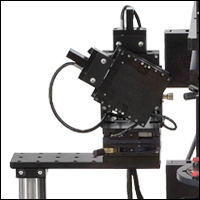
Click for Details
Figure G3.1 Micromanipulator Shown Mounted on a Manual Rigid Stand with MPR8 Dovetail Rail
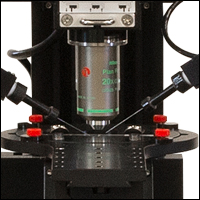
Click for Details
Figure G3.2 MPRC Recording Chamber Holder with a Custom Insert (Not Included)
- MPR4(/M) and MPR8(/M) Tapped Dovetail Rails:
- 4" (100 mm) or 8" (200 mm) Long Platform for Holding Micromanipulators or Other Equipment
- 1/4"-20 (M6 x 1.0) Tapped Holes at 1" (25.0 mm) Spacings
- Max Load Capacity of 20 lbs at Full Extension
- MPRM(/M) Rectangular Insert Arm Designed for Multiple Slides, Petri Dishes, Our MZS500-E Z-Axis Piezo Stage, Well Plates, and Other Inserts (Sold Separately Below)
- MPRC(/M) Recording Chamber Arm Holds Ø110 mm Recording Chambers or Slide Holder Inserts (Sold Separately Below)
- 66 mm Dovetail for Compatibility with MPP Series Posts (Sold Separately Above)
Dovetail Rails
The MPR4(/M) and MPR8(/M) Dovetail Rails are 4" (100 mm) or 8" (200 mm) long, respectively, and provide an array of tapped holes for mounting micromanipulators and other experimental equipment. Both rail platforms are 59.9 mm wide and feature 1/4"-20 (M6 x 1.0) tapped holes at 1" (25.0 mm) spacings. When the platform is extended fully (i.e., both dovetail locking screws can still be engaged), the outermost edge of the platform will support a load of 20 lbs (9 kg).
Rectangular Insert Arm
The MPRM(/M) Rectangular Insert Arm has a rectangular slot that is compatible with the 6.70" x 5.13" inserts sold separately below in Step 4a. These inserts can be used to mount samples or experimental equipment in or near the optical path of a microscope, such as our Cerna systems, enabling a variety of experimental configurations beyond those achievable with our more basic sample holders. Eight 1/4"-20 (M6 x 1.0) tapped holes at 1" (25.0 mm) spacings on top of the arm can be used to mount additional experimental equipment.
Recording Chamber Holder Arm
The MPRC(/M) Recording Chamber Holder is designed for easily mounting a recording chamber at the desired location in a microscope's optical path. The top platform has a Ø110 mm opening with a 5 mm wide lip and four clamps to securely mount a recording chamber in the optical path. In Step 4b, we also offer the MPSH2 and MPSH2SS slide holder inserts for mounting a microscope slide (up to 26.0 mm x 76.2 mm). The MPSH2 slide holder has a base plate made of non-magnetic aluminum, while the MPSH2SS slide holder is stainless steel and ideal for experimental setups that require a magnetic surface. Additionally, both slide holders have a low-profile design, reducing the potential for collisions with microscope objectives and facilitating the exchange of slides. For custom plate inserts, please contact Tech Support. Additionally, fifteen 1/4"-20 (M6 x 1.0) tapped holes at 1" (25.0 mm) spacings on top of the arm can be used to mount additional experimental equipment.
| Table G3.3 Horizontal Adjustment | |||
|---|---|---|---|
| Imperial Item # | Travel | Metric Item # | Travel |
| MPR4 | 2.43" | MPR4/M | 60.0 mm |
| MPR8 | 6.43" | MPR8/M | 160.0 mm |
| MPRM | 1.98" | MPRM/M | 50.2 mm |
| MPRC | 4.50" | MPRC/M | 114.2 mm |
Horizontal Rail or Arm Adjustment
To allow users to fine tune the position of the rail or arm underneath the objective, each of the platforms above features a dovetail on the underside. This dovetail, which is also used in Thorlabs' 66 mm optical rails, is held in place by the clamp on top of the posts sold in Step 2 and its two screws that accept a 2.5 mm balldriver. Loosening these screws lets the rail or arm translate horizontally over the range indicated in Table G3.3. This adjustment range also allows the rigid post holder be positioned over a range of locations on the tabletop.

| Item # | Features | Photo |
|---|---|---|
| MLS203P2 |
|
 |
| MLS203P10 |
|
 |
| MLS203P13 |
|
 |
| MLS203P1 |
|
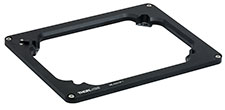 |
| MZS500-E |
|
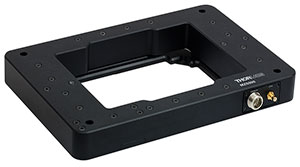 |
| MLS203P5 |
|
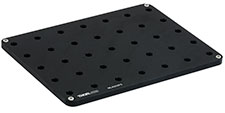 |
| MLS203P4 |
|
|
| MLS203P3 |
|
 |
- Compatible with the MPRM(/M) Insert Holder
- Options Include Slide Holders, Z-Axis Stage, Breadboards, and a Blank Plate
These inserts can be used to mount samples or experimental equipment in or near the optical path of the Cerna microscope, enabling a variety of experimental configurations beyond those achievable with our more basic sample holders. The MLS203P10 and MLS203P13 multi-slide holders feature precise spring-loaded slide retention mechanisms and unobstructed bidirectional objective access to the slides.
These inserts are also compatible with our MLS203-1 and MLS203-2 Fast XY Scanning Stages.
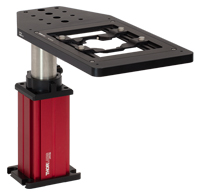
Click to Enlarge
Figure G4.1 MP15M Stand with Rectangular Insert Holder and MLS203P2 Slide/Petri Dish Holder
(Each Sold Separately)
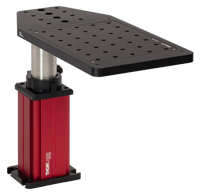
Click to Enlarge
Figure G4.2 MP15M Stand with Rectangular Insert Holder and MLS203P5 Breadboard Insert
(Each Sold Separately)

- Low-Profile Slide Holder Inserts in Two Material Variants:
- Aluminum (Non-Magnetic)
- Stainless Steel
- Compatible with MPRC(/M) Recording Chamber Holders (Sold Separately Above)
- Fits Microscope Slides up to 26.0 mm x 76.2 mm
- Center Bore for Compatibility with Ø35 mm Petri Dishes
The MPSH2 and MPSH2SS slide holder inserts are designed to mount a microscope slide (up to 26.0 mm x 76.2 mm) in our Ø110 mm recording chamber holders. A central cutout also accommodates a Ø35 mm Petri dish. The MPSH2 slide holder has a base plate made of non-magnetic aluminum, while the MPSH2SS slide holder is stainless steel and ideal for experimental setups that require a magnetic surface. Additionally, both slide holders have a low-profile design, reducing the potential for collisions with microscope objectives and facilitating the exchange of slides. For custom plate inserts, please contact Tech Support.

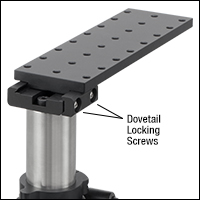
Click for Details
Figure G6.2 Slidable Dovetail is Locked into Place via Two Locking Screws

Click for Details
Figure G6.1 Micromanipulator Shown Mounted on a Manual Rigid Stand with Tapped Platform
- Includes MPR8(/M) Rail for Holding Micromanipulators or Other Equipment
- 24 1/4"-20 or M6 x 1.0 Tapped Holes for Mounting Flexibility
- Quick-Release Clamp Enables Tool-Free Positioning
- Collar Provides Stops at User-Specified Height and Angle
- Horizontal, Vertical, and Rotational Adjustments Provide Flexible Positioning
- Maximum Load of 20 lbs at Full Extension
- Translation Stages for Rigid Stands Available
These preconfigured manual rigid stands each include an MPR8(/M) 8" x 2.36 " (200 mm x 59.9 mm) rail platform with 24 1/4"-20 (M6 x 1.0) tapped holes at 1" (25.0 mm) spacings for mounting micromanipulators and other experimental equipment at various heights. When the platform is extended fully (i.e., both dovetail locking screws can still be engaged), the outermost edge of the platform will support a load of 20 lbs (9 kg).
To allow fine tuning of the location of the mounted equipment, the rail platform features a dovetail on the underside. This dovetail, which is also used in Thorlabs' 66 mm optical rails, is held in place by two screws that accept a 2.5 mm balldriver, as shown in Figure G6.2. Loosening these screws lets the dovetail platform translate horizontally over a 6.43" or 160.0 mm range, respectively. This long adjustment range also lets the red post holder be positioned over a range of locations on the tabletop.
The base can be secured to a tabletop via four counterbored slots that accept 1/4"-20 (M6 x 1.0) cap screws. The manual rigid stand can be mounted to our quick-connect and self-contained manual translation stages using the MPA1(/M) adapter plate or our motorized translation stages using the PLST(/M) adapter plate.


Click to Enlarge
Figure G7.2 MP15M Preconfigured Rigid Stand with MLS203P5 Breadboard Insert (Each Sold Separately)

Click to Enlarge
Figure G7.1 MP15M Preconfigured Rigid Stand with MLS203P2 Slide/Petri Dish Holder (Each Sold Separately)
- Includes MPRM(/M) Insert Holder Designed for Multiple Slides, Petri Dishes, Our MZS500-E Z-Axis Piezo Stage, Well Plates, and User-Designed Inserts
- Compatible Inserts Sold Above in Step 4a
- Quick-Release Clamp Enables Tool-Free Positioning
- Collar Provides Stops at User-Specified Height and Angle
- Horizontal, Vertical, and Rotational Adjustments Provide Flexible Positioning
- Translation Stages for Rigid Stands Available
The MP15M(/M) preconfigured manual rigid stand includes an MPRM(/M) rectangular insert holder that is compatible with the 6.70" x 5.13" inserts sold separately in Step 4a. The inserts can be used to mount samples or experimental equipment in or near the optical path of a microscope, such as our Cerna Systems, enabling a variety of experimental configurations beyond those achievable with our more basic sample holders. Eight 1/4"-20 or M6 x 1.0 tapped holes on top of the insert holder platform can be used to mount additional experimental equipment.
To allow fine tuning of the location of the insert, the platform features a dovetail cutout on the underside. This dovetail, which is also used in Thorlabs' 66 mm optical rails, is held in place by two screws that accept a 2.5 mm balldriver. Loosening these screws lets the insert holder translate horizontally over a 1.98" (50.2 mm) range. This long adjustment range also lets the red post holder be positioned over a range of locations on the tabletop.
The base can be secured to a tabletop via four counterbored slots that accept 1/4"-20 (M6 x 1.0) cap screws. The manual rigid stand can be mounted to our quick-connect and self-contained manual translation stages using the MPA1(/M) adapter plate or our motorized translation stages using the PLST(/M) adapter plate.
 Products Home
Products Home


















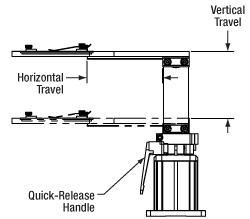
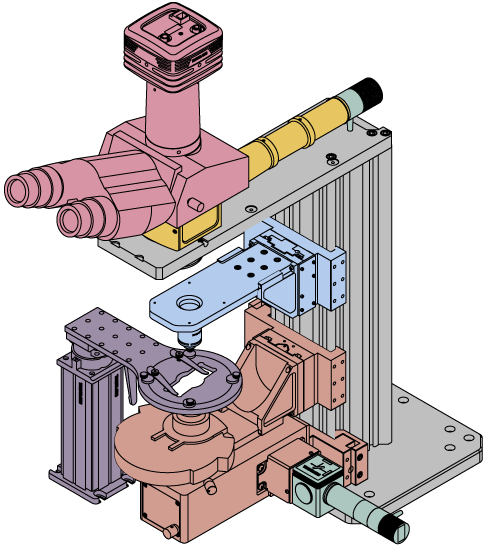























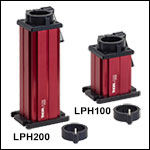
 Zoom
Zoom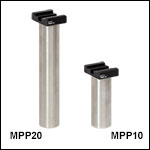
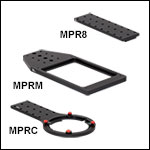
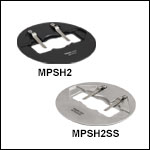
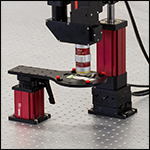
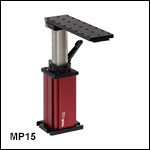
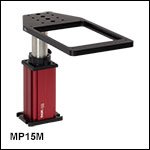
 Manual Rigid Stands
Manual Rigid Stands